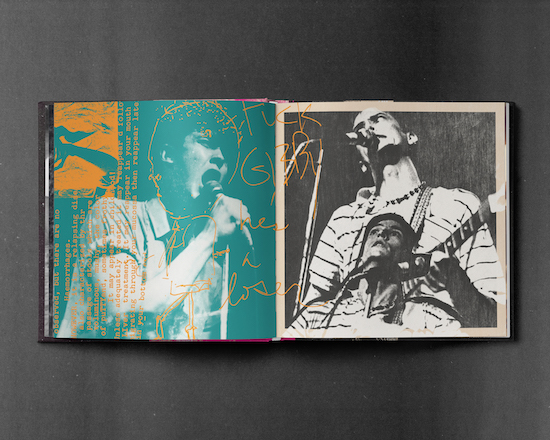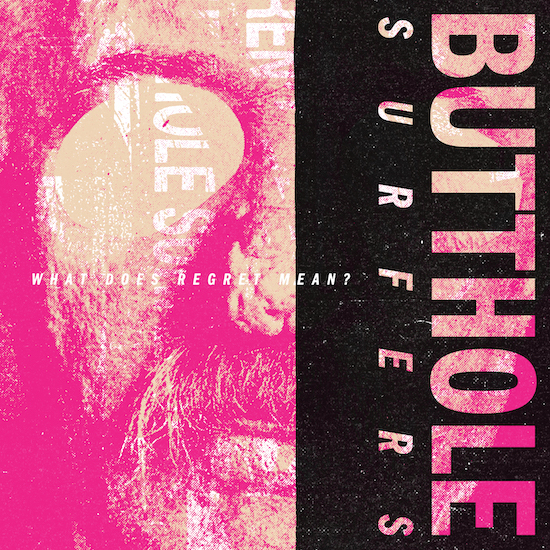One of the key things about encountering the glorious psychedelic mess that was the Butthole Surfers’ recorded output in the late 1980s was that, in those largely pre-Internet days, there wasn’t much information to be gleaned about them. This was a band who were as apparently mysterious as their highly disturbing album imagery and titles. What was a listener raised on copiously credited LP liner notes to make of the record sleeves for a slew of surrealist albums dubbed Locust Abortion Technician, Psychic, Powerless, Another Man’s Sac or Rembrandt Pussyhorse that came with no list of personnel and occasionally not even song titles, just symbols scrawled on the record centre in a pastiche of Led Zeppelin’s esoteric and pompous occultism?
What was certain, upon being presented with a second-hand cassette to listen to one day outside the college gates, was that the Buttholes were at once a group who traded in sinister whimsy and were deadly serious about pushing the limits of their spasmodic musical derangements as far as the listener was prepared to be taken. Interviews in the music press revealed names and members. Murkily uninformative spots on Snub TV showed a band who loved their dogs as much as they did doing their own heads. Concert bootlegs scrounged up in Camden Market – as well as the stupendous live VHS tape Blind Eye Sees All – depicted a band who were happily setting about inflicting musical as well as physical damage onstage in glorious defiance of notions of both health and safety, a venue’s audience capacity, and good taste.
So it feels quite strange some thirty years later that there’s now a coffee table book of photographs and other memorabilia in existence. The 150 pages of pictures that make up the bulk of Aaron Tanner’s insightfully compiled What Does Regret Mean? are accompanied by capsule anecdotes from band members, friends, and contemporaries, recounting tall-sounding tales and legends of a group of what their Texan neighbours might well have viewed as degenerate drugged-up freaks and weirdos. A group who managed to change lives and the very form of rock music along the way. Judging by Mickey Melchiondo’s foreword (the longest piece of continuous text in the book), Dean and Gene Ween’s experience of discovering the Buttholes in the eighties was a similarly murky voyage into the unsettling and unknown, one which they certainly took to heart as a template of how to make music themselves, as was immediately evident from listening to the outrageously bizarre sounds they emitted on Ween’s first few deep-fried albums.
The years after their eighties apex saw the Butthole Surfers drawn into major label attempts to sell their particular take on gleeful nihilism to a college radio-friendly audience, taking in working with John Paul Jones along the way, as well as appearances on Gary Shandling’s show and the usual sort of film soundtracks. In the mid-nineties, the acid-heads’ mind-manglers of choice diminished somewhat with each new album, until the Buttholes Surfers more or less faded from what remained of the collective consciousness. They took a well-deserved recess from full-time excess, but deservedly so after a period of fertile creativity that left a legacy that they continue to revisit live, though with nothing to equal their heyday released in years – even if a new album is apparently due in 2019.

Rather than relying on editorialising about the band’s chequered history, Tanner has opted to intersperse short paragraphs from musicians and others from across the US punk and post-punk scenes who knew, witnessed, or otherwise encountered the Buttholes over the decades. While this leaves the book reliant on its pictures to tell the story, this they do more than adequately, from the sweaty live photos via occasional backstage and on-tour snapshots, including publicity mugshots of a particularly disturbing variety, to the plentiful gig posters and flyers, many hand-scrawled in inimitable DIY fashion.
What Does Regret Mean? covers the band’s photographic history in chronological order, peppered with album sleeves and press clippings – mostly glowing or bemused, sometimes knowingly disappointed – presented in suitably cut-up fanzine style. The book is lovingly laid out with all the collectors’ edition trappings, including a flexidisc of an unreleased track, ‘Locust Abortion Technician Medley’ from the never-realised Human Cannonball 7-inch single. The hardcore will want the deluxe edition, complete with slipcase, posters and art prints, but even in its most stripped back format, this is an impressively weighty tome. As Derrick Bostrom from the Meat Puppets notes, “if you have a naked coffee table in need of a book, the Buttholes have you covered there too.”

There are several pictures where Gibby Haynes somehow looks surprised that he has been caught in the act of setting Teresa Nervosa and King Coffey’s cymbals alight, which he was wont to do on many occasions. Perhaps he was a tad concerned for the implications too – or maybe he was simply exhibiting a primal fight-or-flight response in an addled state of consciousness. As repeated witness reports attest, the band’s onstage antics and the application of overdose-levels of volume, unpleasant penile reconstruction projections and extreme usage of strobes in the eighties were usually disturbing (“They all laughed constantly, and seemingly wickedly, at themselves and the confused, terrified audience,” recounts Pavement’s Bob Nastanovich of seeing the band). Often, these extremes of audio-visual overload were enough to provoke fear, disgust, amazement, and inspirational bliss in good measure, seemingly in a causal relationship to the quantities of chemical assistance that band and crowd had consumed.
What Does Regret Mean? is not the place to look for a detailed biography of a band who, in Neko Case ‘s words, “knowingly and willingly made music for freaks.” That role currently resides with James Burns’s exhaustive Buttholes biography, Let’s Go To Hell, which delves deeply into their story across 500 pages of scattered memories . Instead, Tanner has curated a visceral collage of images which successfully combines soundbites from their peers with the visibly demonic glint in the band’s eyes as their story unfolds over the years. Together, the photos and the print ephemera paint a vivid and persisting picture of what was at one point probably the most outrageous band the world had seen, especially in the context of Reagan’s America.
As Gibby growled through a plethora of effects on ‘Jimi’ from Hairway To Steven (quoting from Oliver Stone’s Platoon), “What do you know about reality? I am reality!” That’s pretty much how it is to be drawn into the lysergic world of the Butthole Surfers, perhaps with a tinge of the post-Vietnam mania that could also be found in Apocalypse Now’s LSD-drenched battle scenes. In this case it might be through the surprising medium of a lavish coffee table book. But that works too.
The Butthole Surfers: What Does Regret Mean by Aaron Tanner is publisher by Melodic Virtue


